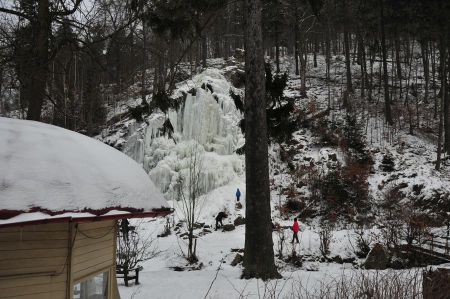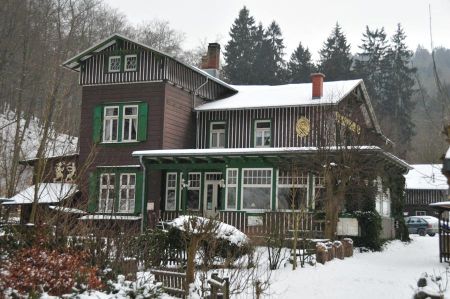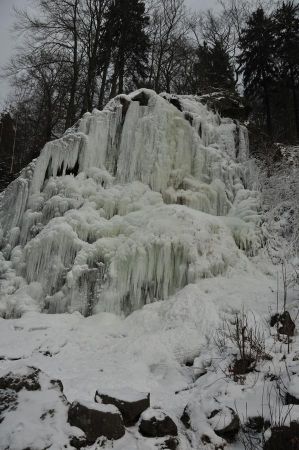Radau Waterfall at Siberian cold - from Torfhaus
- Written by Portal Editor
Radau Waterfall - And if it is just an artificial waterfall, we have taken the path from the peat house in the direction of Goslar for a little stop in icy cold conditions , after all minus 17 degrees, just to take a look at the equivalent of the Romkerhaller Waterfall.
The name is based on the same named river Radau, which flows above the waterfall through the Radautal into the Aller.
Radau Waterfall - a small river from the high bog area Torfhaus
 Since the Middle Ages, the Radau was used to raft tree trunks and peat on wooden pallets that were felled in the resin. In order to have sufficient propulsion, the water of the Radau was built up with the help of six raft locks.
Since the Middle Ages, the Radau was used to raft tree trunks and peat on wooden pallets that were felled in the resin. In order to have sufficient propulsion, the water of the Radau was built up with the help of six raft locks.
The material to be rafted, which had previously been deposited in the river, drifted down to its destination after opening the locks with the additional stream of water. With the construction of the railway line, the wood was transported by rail and rafting was abandoned.
The Radau itself is only a 21.1 km long, right tributary of the Oker in the district of Goslar in Lower Saxony. It rises in the Upper Harz in the area of Altenauer Ortsteil Torfhaus, its source is located near the Lerchenköpfe (821 m above sea level) located Torfhausmoor (also Radaubornmoor called) at about 800 m altitude.
High moor below the Brocken - peat house
 Just a few meters below its source, the Radau flows into the Harz National Park. By the way: If you are interested in raised bogs and their flora and fauna, we recommend the National Park House directly at the Torfhaus car park. In the source area and in the further course in the Radaubruch numerous moor pits flow. Several times we have been in this area on hiking tours, which lead up to the chunks. A wonderful path without being too exhausting. Alternatively, you can of course take the steam train to the Brocken and, conversely, hike back to the peat house. Also in winter a great tour. However, it is advisable to be prepared for very low temperatures, which is especially true for the Brocken.
Just a few meters below its source, the Radau flows into the Harz National Park. By the way: If you are interested in raised bogs and their flora and fauna, we recommend the National Park House directly at the Torfhaus car park. In the source area and in the further course in the Radaubruch numerous moor pits flow. Several times we have been in this area on hiking tours, which lead up to the chunks. A wonderful path without being too exhausting. Alternatively, you can of course take the steam train to the Brocken and, conversely, hike back to the peat house. Also in winter a great tour. However, it is advisable to be prepared for very low temperatures, which is especially true for the Brocken.
After the confluence with Baste, where it changes from the National Park into the Harz nature park, the typical low mountain river has deeply cut Radautal. After the confluence of Lohnbach flowing from the right, from where it runs along the border of the east of the park and the nature park in the west, and Tiefenbach coming from the left, water is transferred from the river to the artificially created Radau Waterfall.
The artificial Radau waterfall unspectacular calm – because frozen now
The artificial Radau waterfall is located on the western slope of Winterberg (585.3 m). To feed the approximately 23-meter-high waterfall was from a point about 300 Bachmeter northwest below the confluence of Lohnbachs created a roundabout branch of the Radau, the "Hanggraben". Below the waterfall, the water flows back into the Radau. Here the Radau has already covered 400 meters. At the next Gabbro quarry, it underpasses the Bundesstraße 4 for the first time.
The Radau Waterfall including the ditch was established in 1859 at the instigation of Philipp August von Amsberg (founder of the Ducal Braunschweig State Railway) and the State Bath Commissioner Hermann Dommes to stimulate tourism and is still today due to its location close to the main road 4 a tourist attraction dar especially in winter, when the bodies of water deep frozen form a mighty lump of unusual shape and structure with many icicles.
Radau - another tributary to Aller
 At the Radauberg forester's lodge, the Radau Waterfall flows into populated areas and a little later into the spa area of Bad Harzburg; She finally leaves the National Park and Harz Nature Park. In the Harzburg city area, where the river passes the east of the Great Burgberg (485 m), its shore is largely fixed with stones. North of the L 501 (Herzog-Julius-Straße), the last heavily canalized Stübchenbach flows into the Radau.
At the Radauberg forester's lodge, the Radau Waterfall flows into populated areas and a little later into the spa area of Bad Harzburg; She finally leaves the National Park and Harz Nature Park. In the Harzburg city area, where the river passes the east of the Great Burgberg (485 m), its shore is largely fixed with stones. North of the L 501 (Herzog-Julius-Straße), the last heavily canalized Stübchenbach flows into the Radau.
At the district Mathildenhütte the Radau passes the settlement Radauanger on the left along with municipal sewage treatment plant. Below the Radau estate and the Radaumühle, where the river leaves the Bad Harzburg urban area, it has only about 50 vertical meters to cover the mouth through a vast gravel mining area. Below the mining area flows from the left from Harlingerode coming Teufelsbach and in the further course of two in Radauer wood springing streams. Thereafter, the Radau flows through the Goslar district of Vienenburg and reaches northeast of it and just before the district of Wiedelah at the eastern end of the Harly Forest at 130 m altitude there coming from the west Aller inflow Oker.
Please read as well:
Market Church of the Holy Spirit in Clausthal-Zellerfeld
Rime on grasses and trees in Friesland
-
 Frozen Waterfall next to Torfhaus
Frozen Waterfall next to Torfhaus
Frozen Waterfall next to Torfhaus
Frozen Waterfall next to Torfhaus
-
 Frozen Waterfall next to Torfhaus
Frozen Waterfall next to Torfhaus
Frozen Waterfall next to Torfhaus
Frozen Waterfall next to Torfhaus
-
 Frozen Waterfall next to Torfhaus
Frozen Waterfall next to Torfhaus
Frozen Waterfall next to Torfhaus
Frozen Waterfall next to Torfhaus
-
 Frozen Waterfall next to Torfhaus
Frozen Waterfall next to Torfhaus
Frozen Waterfall next to Torfhaus
Frozen Waterfall next to Torfhaus
-
 Frozen Waterfall next to Torfhaus
Frozen Waterfall next to Torfhaus
Frozen Waterfall next to Torfhaus
Frozen Waterfall next to Torfhaus
-
 Frozen Waterfall next to Torfhaus
Frozen Waterfall next to Torfhaus
Frozen Waterfall next to Torfhaus
Frozen Waterfall next to Torfhaus
-
 Frozen Waterfall next to Torfhaus
Frozen Waterfall next to Torfhaus
Frozen Waterfall next to Torfhaus
Frozen Waterfall next to Torfhaus
-
 Frozen Waterfall next to Torfhaus
Frozen Waterfall next to Torfhaus
Frozen Waterfall next to Torfhaus
Frozen Waterfall next to Torfhaus
-
 Frozen Waterfall next to Torfhaus
Frozen Waterfall next to Torfhaus
Frozen Waterfall next to Torfhaus
Frozen Waterfall next to Torfhaus
-
 Frozen Waterfall next to Torfhaus
Frozen Waterfall next to Torfhaus
Frozen Waterfall next to Torfhaus
Frozen Waterfall next to Torfhaus
-
 Frozen Waterfall next to Torfhaus
Frozen Waterfall next to Torfhaus
Frozen Waterfall next to Torfhaus
Frozen Waterfall next to Torfhaus
-
 Frozen Waterfall next to Torfhaus
Frozen Waterfall next to Torfhaus
Frozen Waterfall next to Torfhaus
Frozen Waterfall next to Torfhaus
https://www.alaturka.info/en/germany/lower-saxony/4336-from-torfhaus-to-radau-waterfall-at-siberian-cold#sigProId6d14eb3948
